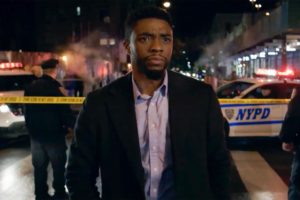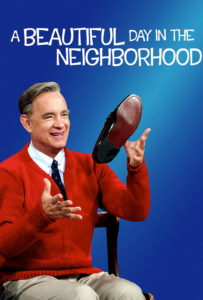Scorsese’s Greatest Shots
Posted on November 23, 2019 at 3:08 pm
The Ringer picks out some of Martin Scorsese’s most striking — and most influential shots.
Posted on November 23, 2019 at 3:08 pm
The Ringer picks out some of Martin Scorsese’s most striking — and most influential shots.
Posted on November 22, 2019 at 8:04 am
“The Good Place” is my favorite show, and I love the way it grapples with the deepest questions of existence in a sophisticated and nuanced but remarkably accessible (and funny and endearing) way. What does it mean to be a good person? Why should we try to be good? What do we owe each other? I watch every week, then listen to the terrific podcast with Marc Evan Jackson (who plays Sean, the head demon), then watch the episode again to catch the details they discuss. The podcast features actors, behind-the-scenes people like writers, producers, special effects, set, and costume designers, and you might even hear a real expert on moral philosophy.
And so of course the has become a text, with “The Good Class” being taught at Notre Dame. I love the description of the answers they got to the application for admission and the comments from “Good Place” creator Mike Shur.
The Good Class, at least, provides one place where people convene every week to talk about what they just saw.
“ the idea of what it means to watch and debate television like this together. To use television as a vehicle. It’s hard to talk about ethical issues these days. It’s hard to have a common language that’s not hyper politicized or hyper reductive,” Sullivan says. “We need cultural questions like this to do some of the 2,400-year-old work on our souls.”
Posted on November 21, 2019 at 5:36 pm
B +| Lowest Recommended Age: | Mature High Schooler |
| MPAA Rating: | Rated R for violence and language throughout |
| Profanity: | Strong language |
| Alcohol/ Drugs: | Drug dealing |
| Violence/ Scariness: | Extended peril and violence, guns, chases, many characters injured and killed, disturbing and graphic images |
| Diversity Issues: | None |
| Date Released to Theaters: | November 22, 2019 |
| Date Released to DVD: | February 17, 2020 |

Andre (Boseman) is a police detective, the son of a cop who died in the line of duty. In a flashback we see him as a child, weeping at his father’s funeral as the clergyman quoting Romans 13:4: “If you do wrong, be afraid, for he does not bear the sword in vain. For he is the servant of God, an avenger who carries out God’s wrath on the wrongdoer.” In the present day, we meet him at the most recent in a series of meetings with Internal Affairs, an automatic inquiry after an officer discharges a weapon. He is not apologetic. “Justice comes at a cost…I am the sharp edge of that determination.” His reputation is for being trigger-happy, but he insists that each time he shot someone it was justified and that he never drew first. He is cool under pressure, certain of his choices. At home, we see him caring for his fragile mother, and he is patient and tender when she is forgetful. But she has certainty, too, telling him to “look the devil in the eye.”
And then a robbery goes terribly wrong. Two guys (Taylor Kitsch and James) put scary scarves over their faces and bust into a wine cellar where something even more powerful is stored. “Only two of you?” the guy they are holding at gunpoint asks. They were told to expect 30 kilos of cocaine, but it Is 300, uncut, worth much, much more than they expected. In a shoot-out, they kill a civilian and seven cops and critically injure an eighth before escaping with tote bags full of cocaine. And that makes them targets of some very highly motivated people on both sides of the law.
“I wouldn’t mind if you were back at IA tomorrow,” says the precinct captain (J.K. Simmons) whose cops were killed. He urges Dre to “protect” the families of those who died from the agony of trials and the risk that the men responsible would not be convicted. It is clear what he means. Dre’s reputation for being quick on the trigger and his understanding of what families go through when a police office is killed could make him more inclined to quick revenge than slow justice.
The FBI says they will take over in the morning if the two fugitives are not captured. With the 21 bridges to Manhattan and all of the tunnels closed, Dre chases after the men as they try to sell the cocaine and get out of town.
There is nothing special about the script but the action is exciting and there are a couple of strong dramatic confrontations. Boseman and James elevate the material to keep us interested even when the storyline fails to challenge us.
Parents should know that this is a cops-and-robbers-and-drug-dealers story with extended, intense, and graphic peril and violence, with many characters injured and killed and disturbing images. There are chases and shoot-outs and betrayals and very strong language.
Family discussion: Why did Dre and the person he talked to in the house come to different conclusions? How did Dre’s losing his father affect his outlook?
If you like this, try: “16 Blocks” and “Fort Apache the Bronx”
Posted on November 21, 2019 at 5:16 pm
A-| Lowest Recommended Age: | Middle School |
| MPAA Rating: | Rated PG for some strong thematic material, a brief fight, and some mild language |
| Profanity: | Some mild language |
| Alcohol/ Drugs: | References to substance abuse, drinking and drunkenness |
| Violence/ Scariness: | Scuffles, punch, illness, sad death of a parent |
| Diversity Issues: | None |
| Date Released to Theaters: | November 21, 2019 |
| Date Released to DVD: | February 17, 2020 |

So, Rogers is not the story here. Instead, it is about the impact he had on one troubled adult, and what that means about and for each of us.
Based on the true story of journalist Tom Junod, who interviewed Rogers for a 1998 profile in Esquire, this film, by Micah Fitzerman-Blue and Noah Harpster and directed by Marielle Heller (“Can You Ever Forgive Me?” “The Diary of a Teenage Girl”), is about how the experience of interviewing, or, rather, attempting to interview Fred Rogers was transformational in the life of the reporter (here called Lloyd and played by Matthew Rhys).
Lloyd is a new father struggling with unresolved feelings of abandonment and anger at his own father (Chris Cooper). He is a hard-hitting, skeptical, investigative journalist, not accustomed to or comfortable with assignments to write fluffy features about the hosts of television shows for children. He is assigned to write about Mr. Rogers for the “heroes” issue of Esquire. But he is not someone who takes easily to the idea of heroes. Is his inclination to expose what prominent or influential people want to hide based in part on the father who let him down? Perhaps. But is that the right approach to Mr. Rogers? “Don’t ruin my childhood,” his wife warns. And when he asks Mr. Rogers about how he differs from the character he plays on television, the gentle clergyman-turned-unlikely-television-star genuinely does not understand the question. He cannot be anything other than what he is.
More important, he has a “compulsive intimacy” that prompted him to ask questions far more insightful and meaningful than the ones Lloyd was asking him to answer for the article.
Director Marielle Heller and screenwriters Micah Fitzerman-Blue and Noah Harpster bring a lovely delicacy and an almost fairy tale quality to the story. At times it seems we are watching an episode of the series and then we see that the “real world” and the world of the show blend together — both the “real” home where Mr. Rogers changes into his cardigan and sneakers and feeds the fish and the “imaginary” world of the kingdom of Make Believe. Just as all of the characters on the show represent parts of Fred Rogers’ personality, the heart of the movie is integrating all of its worlds and emotions.
A story relies on some kind of change experienced by the main character. He or she has to lose something or learn something or complete something. Mr. Rogers was already so evolved that trying to make him the main character of a feature film would not have worked. So wisely the story here is about the effect Mr. Rogers had on one troubled soul, helping him to lose something, to learn something, and to complete something. And in doing so, it helps us locate some of the compulsive intimacy that makes Mr. Rogers’ viewers into friends who feel accepted, understood, and very lucky to be in his neighborhood.
NOTE: Look carefully at the other customers in the scene set in a Chinese restaurant, when Mr. Rogers and Lloyd are eating together. They are the real-life friends and family of Mr. Rogers, including his wife Joanne (played by Maryann Plunkett in the film) and his producer Bill Isler (played by Enrico Colantoni).
Parents should know that this movie includes frank depiction of family dysfunction with an adult son still resentful and angry about his father’s abandonment, drinking and drunkenness, a scuffle, terminal illness, and some mild language.
Family discussion: How would you answer Mr. Rogers’ questions? What did Lloyd learn from him?
If you like this, try; the documentary “Won’t You Be My Neighbor?” and the episodes of “Mr. Roger’s Neighborhood” and my interview with the journalist whose article inspired the film and the men who wrote the screenplay.
Posted on November 21, 2019 at 10:26 am
I’m a big fan of Jane Austen’s Emma (the novel she famously described as having a heroine no one would like) and the movie version with Gwyneth Paltrow, Jeremy Northam, and Toni Collette. This new version, starring Anna Taylor-Joy, Johnny Flynn, Bill Nighy, Mia Goth, Miranda Hart, Josh O’Connor, Callum Turner, Rupert Graves, Gemma Whelan, Amber Anderson, Tanya Reynolds, and Connor Swindells, looks just as delightful.